Participant input
Throughout the event, participants provided their feedback and advice on the cases discussed. You can find their input below.
What is one suggestion to ensure representation and influence of people affected by crises in decision-making forums?
- Include affected population in decision making and empower understand about AAP.
- Make space! NGOs should bring people who have received their aid onto their Boards - or at the least set up advisory committees to influence NGO leadership.
- Giving them a voice during program design and agenda-setting.
- Raise awareness, providing mechanisms that enable them to participate directly and effectively, and providing protection and safety factors for them.
- Go beyond the buzzwords: try to honestly spend time and understand the particularities of the communities you are supporting and allow them to guide actions, even if they look different from what you are used to.
- Have representatives of affected people be present in these forums. Have independent structures in place that collect feedback and publish it. Make translators available. Share information and minutes/ invites in language of affected people. etc...
- Involve them throughout the program cycle, involve them in monitoring and evaluation.
- Initiate more field visits and focus group discussions to include their opinions.
- In remote or hard to access areas, and with express permission, responses to needs assessment questions can be recorded and submitted to the forums.
- Stop treating community engagement as extraction of information or validation, and instead go to listen and learn without a plan already set in place.
- Have a clear and trusted line of communication to affected populations through group/CBO representatives.
- Engage them from the beginning of crisis response.
- Be more honest about the dilemmas we face as an aid sector (e.g. prioritization, principles, short vs. long term etc.) to build mutual understanding and seek their input on how to navigate these trade-offs.
- As part of orientation sessions a panel of affected people representatives are elected to act as focal points in decision-making forums.
- Hear their feedback.
- Adapt decision-making forums (language, accessibility, literacy,... ), ensure diversity, transparency, and accountability.
- Make decision-making forums accessible - through location, language etc...
- Global North actors need to give up some seats for at the decision making table for the affected persons.
- Stop holding planning meetings in expensive hotels or agency offices, and instead take them to where those affected by crises are most comfortable.
- Ensure their participation at all levels.
- Involve them from the start and throughout.
- Invite them to participate in the program assessment and design.
- Put the money, or decision making regarding how it is spent, in their hands.
- Focus on the role of the frontline staff to enable participation of crisis affected people.
- Make sure they are invited and that they have the (financial) means to participate in the forum.
- Language accessibility.
- Establish a community representation system or governance system and keep the representatives accountable through regular consultation sessions with common people.
- Review project cycle to incorporate crisis affected people in the design.
- Decolonize aid processes.
- Make sure there are information sharing that is transparent and is led by community members.
- Create programming that ensures direct participation and accountability mechanisms as well as having flexible funding to change programs & activities according to arising needs.
- Take time to understand local landscapes and systems prior to creating new structures.
- Provide information to the community about their rights.
- Work and coordinate with groups.
- Educate participants effectively whilst developing programs.
- "We cannot add value... unless we know the existing value. We cannot know the existing value unless communities tell us. People will not tell us unless they trust us. They will not trust us unless we know how to listen and engage" (P-FIM Case Study)
- Give them a place to participate and be heard on all the phases of the project.
- Put them in the center of the project. Take in account to their ideas.
- Give power away.
- Answer the question: Why should people and communities trust us as humanitarian actors?
- Talk less about "needs" and talk more about "priorities" to create more space for reflecting communities' values and lived experiences in ways that can better influence aid agencies' decision-making processes.
- We need to get donors (including the UN) to become more accountable, and truly get them to support the priorities that are identified by the communities themselves. This is still not the case today.
- Do something with what you learn through e.g. focus group discussions, feedback, conversations, meetings etc. and create a shared effort.
- Incentivize participation.
Case 1
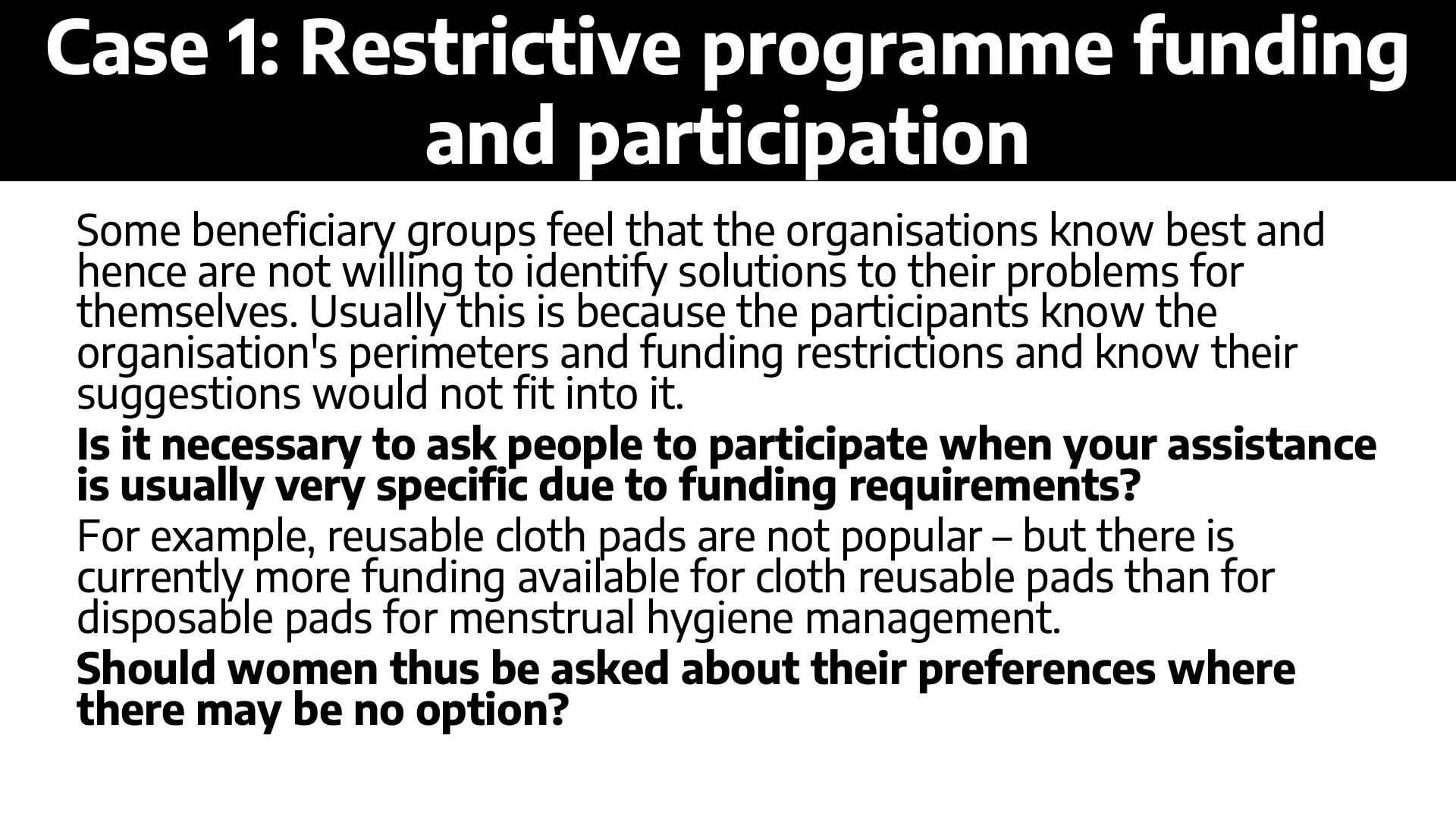
- At the minimum consult with the front line staff (colleagues who work face to face with crisis affected people on the daily basis). They already have a lot of insights and come from the community.
- As long as restrictions and limitations are openly shared and well-known then yes - better to include than not but also to address expectations.
- Plan for the longer inception phase, don't set in stone assistance that is planned. Provide bundled services so people can choose the preferred service or its combination.
- If we are not targeting women, then no need consult, but it's important to gather evidence to bring back to the donors to show that we should change the offering. Advocacy is important.
- This is a basic situation where consultation with communities is critical and humanitarian responses are not designed by organisations without a proper needs assessment.
- They should still be invited to the table to discuss about it and to possibly explain the donor idea behind it (more sustainable, more ecological, etc) and see if they would agree to try it and give feedback afterward
- Encourage cash and vouchers where feasible.
- A joint response plan should be developed through coordination with all stakeholders including donors. This way donors will be accountable.
- Yes, it would be good to still ask about their preferences but inform them of the restrictions.
- Push towards changing donor policies and challenging power structures.
- People of concern should be asked of what they need and not just donor preference.
- Do the humanitarian values of impartiality and independence hamper the need for seeking participation? Is it possible that humanitarian organisations are reluctant to consult where their independence might be called into question.
- We need to create environment of negotiation among the sector with donors on the basis of ground realities and needs of the people affected from the crisis.
- It is still good to get their feedback and find out what would their options be - and why. To use the example of menstrual pads, find out why they do not want them - it might be something like lack of water. This can be communicated to donors.
- Change the question. Instead of: what do you need?', ask: 'would you be interested in...?' - But next time, ask the community even before getting to this point, and use the input for your own vision/strategy so that you can focus on the right funding.
- Also, consider why the funding requirements are there. Is there concern about environment/sustainability issues? Is this part of a livelihood project? It might be a matter of better explanations and possibly training.
- It would be interesting to have an assessment done on how much in-kind is not used, wanted or sold because the good were not right. These should be shared with donors, so they are encouraged in either provided non-earmarked funding or wait for CEA.
- It is not acceptable to question the importance of participation, no matter the size of of the program/fund/ project. There are many approaches to participation, which means we can ensure the participation of the affected people despite the restriction.
- Include the beneficiaries as much as possible
- As the Netherlands Ministry of Foreign Affairs, we strongly recommend un-earmarked flexible funding.
- Projects also need to minimize environmental damage and promote sustainability.
- It is our role as humanitarians to challenge donors and basing that on population’s feedback to enhance credibility.
Case 2
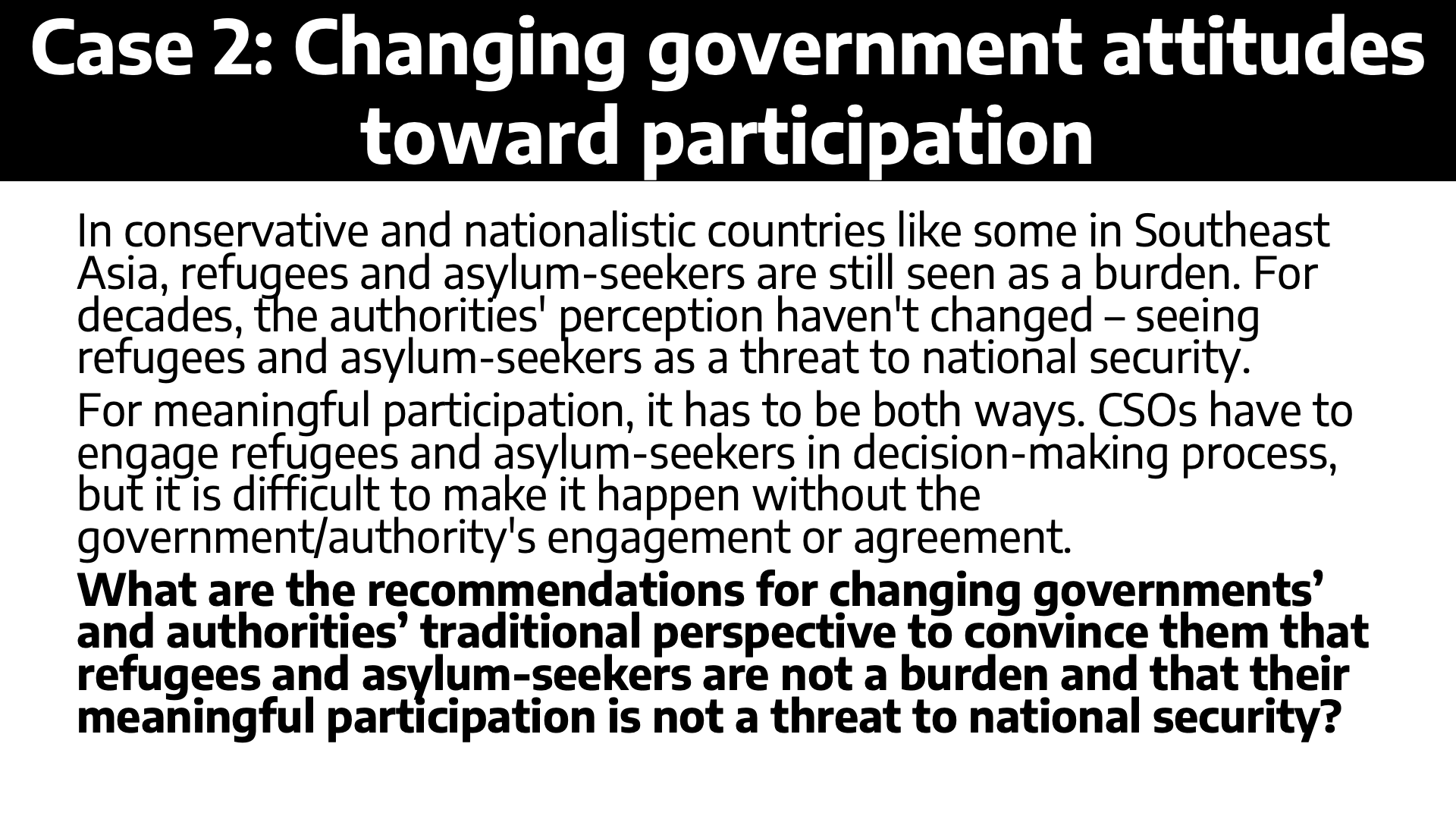
- Advocacy, capacity building, sharing best practices from different contexts/responses, establishing strategic agreement between the government and humanitarian response leaders and donors.
- Dialogue
- I think changing government attitudes needs to look at "Western" countries as well. It's difficult to set an example or tell others how to do better when we see a lot of poor practices of "acceptance" of refugees in Europe, UK and US.
- Beside other elements have been raised, a trust building mechanism should should be set up to ensure that refugee are not a really threat to government. Refugee should be seen from Human right prospective, not a single individual.
- Echoing the panel, we teach that understanding the social reality or context along with moral responsibility centred on people and their communities is critical to achieving effective participation at all levels of effort and focus.
- A tangible example of that is having youth committees that consist of members of both host and refugee communities at the municipal levels.
- To the point on homogeneity: We need to be dedicated to an intersectional approach (rather than ‘women’ or ‘refugees’) when it comes to participation.
- Involve the government from the beginning and advocate around the fact that involving displaced populations is also in their benefit.
- Keep advocating to governments and authorities to ensure inclusion to the greatest extent.
- Showcase positive examples - organize opportunities for host and displaced communities to mix, engage in activities designed and co-led jointly by members of host government and displaced community - working together.
Case 3
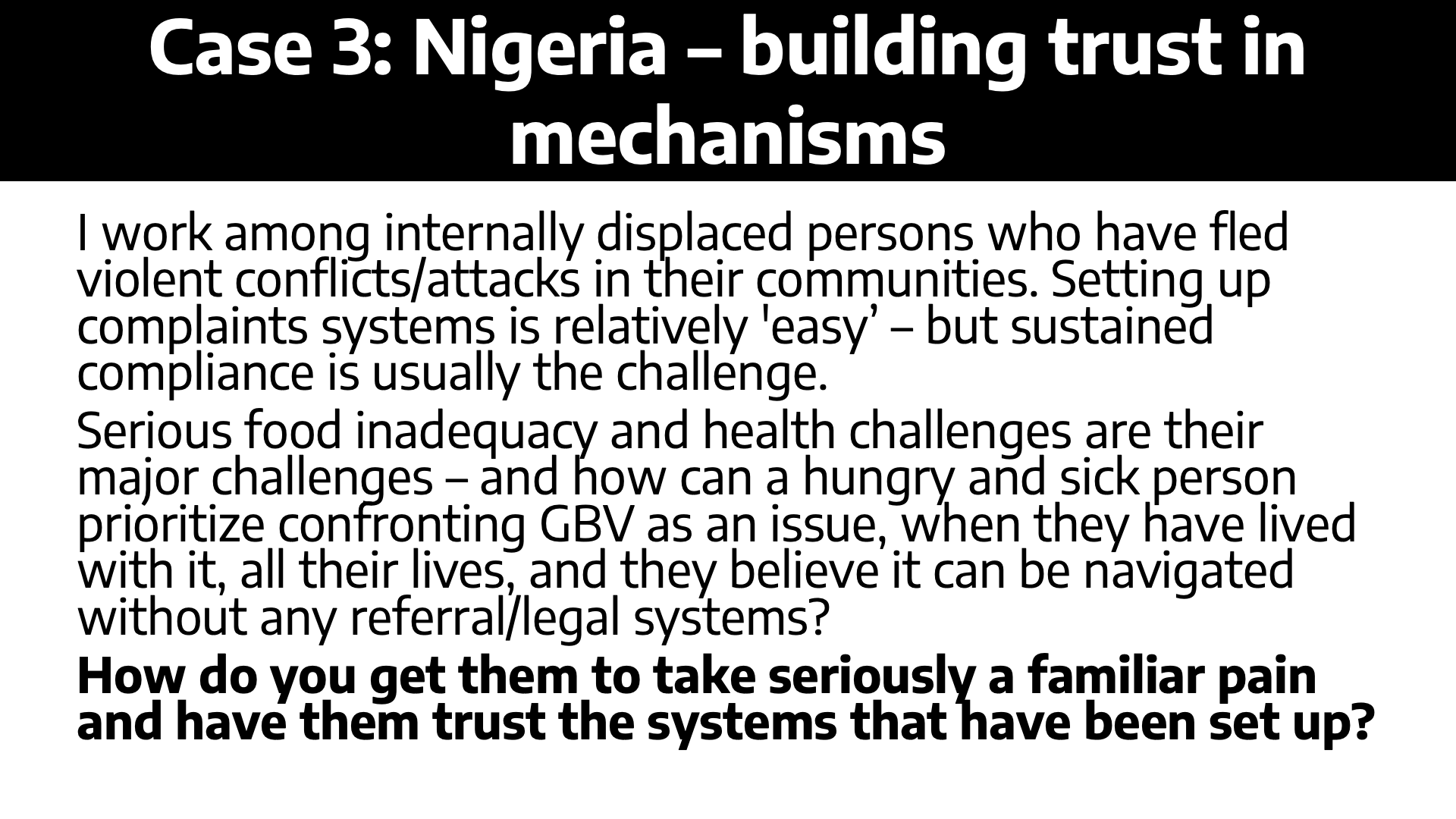
- A feedback mechanism is only as good as the extent to which the feedback loop is closed.
- Raising awareness is key here. when a pain is familiarized, it is normalized and not recognized anymore by the community. investing in raising awareness and information sharing about the system's capacities to support would be helpful.
- Contextualisation is an approach that would help in engaging communities meaningfully. Understanding community dynamics and developing approaches would help in raising awareness of systems' benefits.
- Trusting systems by example. Women-led organisations and existing conflict resolution approaches can make a difference. Acceptance should be present in order to change, incrementally, behaviour that nobody can condone...
- Work with women-led organization. Sensitize the local authorities and hold them accountable.
- First, how long are these systems going to be active? There can be repercussions from accessing systems - and these women have to live with the outcomes/results. What are the goals of these systems? Do they match the goals of the women?
- In my experience, to be used, people need to see value in these mechanisms. Perhaps consulting the community to better understand why there is a lack of trust can help adapting them so they are useful to the community and can serve their purpose.
- Using appropriate language also enable effective participation which reduce mistrust. Engaging and employing refugees as staff/volunteer in humanitarian response would also establish trust."
- Of your staff working on the forefront is not empowered to enable participation, than the trust will be lost. if an organization does not involve frontline staff in the decisions and response, why should the frontline staff do it on their side
Case 4
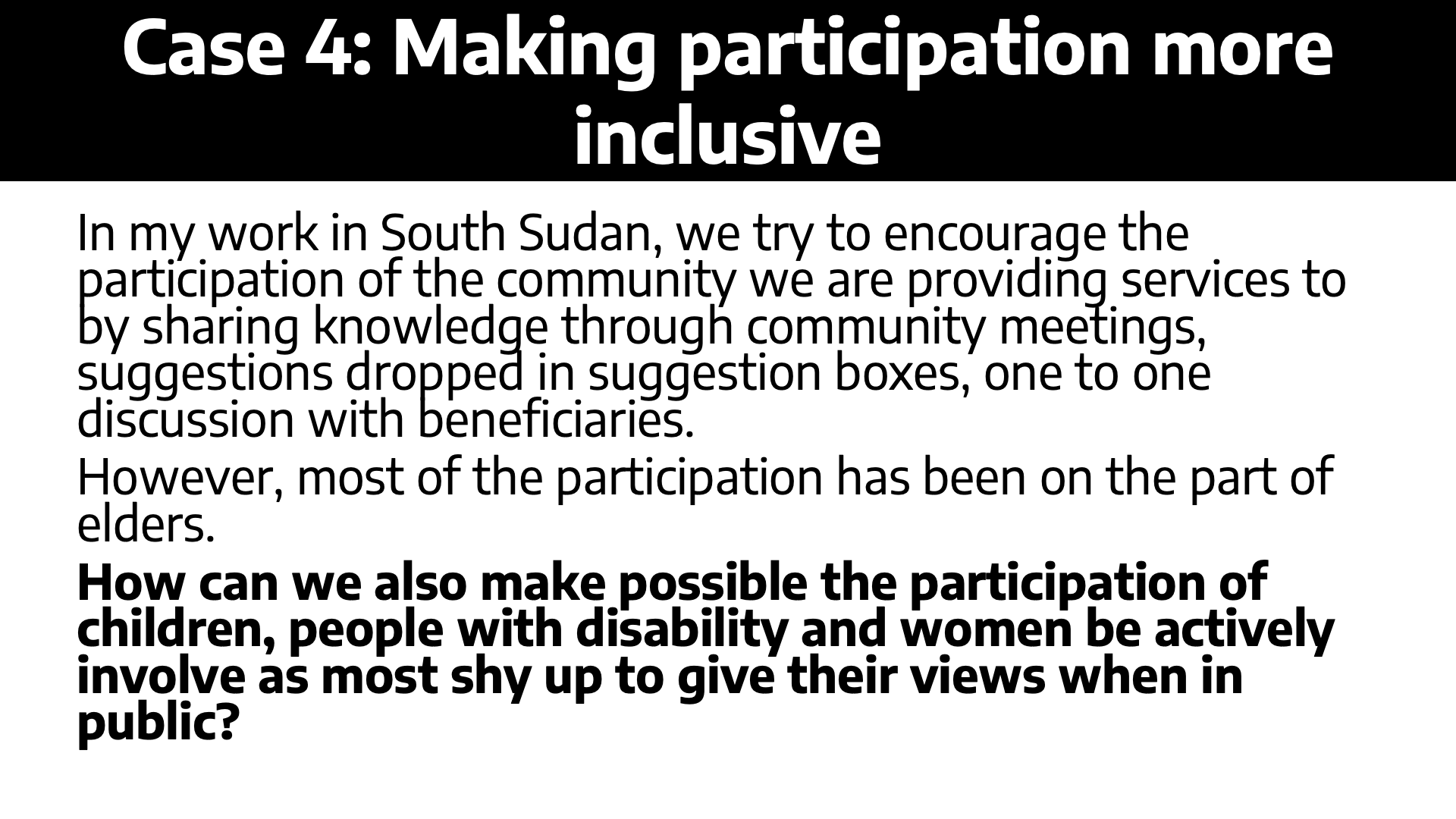
- Participation is a means for more inclusivity - inviting different voices leads to more robust outcomes.
- Direct funding to refugees as a means for enhancing inclusivity in exclusive spaces.
- Organize separate sessions with them and create spaces for one on one if possible.
- Institutions need to take an active approach in welcoming those who have been historically marginalized.
- Including perspectives that understand the realities of policies as they are applied on the ground creates nuance.
- Maybe through other activities as an entry point such as women group learning new skills (computer, jewelry, better gardening). After a few sessions together they might feel more comfortable speaking up
- Make it a game.
- It is context based, but often making separate consultations or enabling spaces for these specific groups to discuss about their concerns, ideas and preferences usually is a first step.
- Specialist organisations can reach affected people others cannot. Forge partnerships with them, consult them as to what/how they do it. Enable youth, women's and children's groups to share openly, even through special sessions targeting them.
- Through art? Drawing, plays, photos/video projects.
- Deeper understanding of the socio-culture practices of the refugees is very critical to understand what are the preferred ways of the community to participate, what are the hinderance they are facing in this changed context.
- Studies show that when women receive financial assistance to start their own business so that they are able to assist with the household expenses, their status and confidence rises, and their opinion is more valued within the household and the community.
- Active participating, that participants are really feeling they are listened and their engagement is meaningful and valued.
- Need to understand the preferred engagement platforms of your different cohorts so you have more inclusive mechanisms.monitor to see if these Platforms change by seasons. Ask who is likely to be included or excluded by a platform selected.
- A good understanding of intersecting structural factors that may prevent people from accessing services or from participating, and working on those factors to enable people' participation.
- This means that everyone is included. Ensure that every individual has access, understands and enabled to exploit own potential. each cohort should be engaged. Children with and without disabilities be involved in play.
Case 5
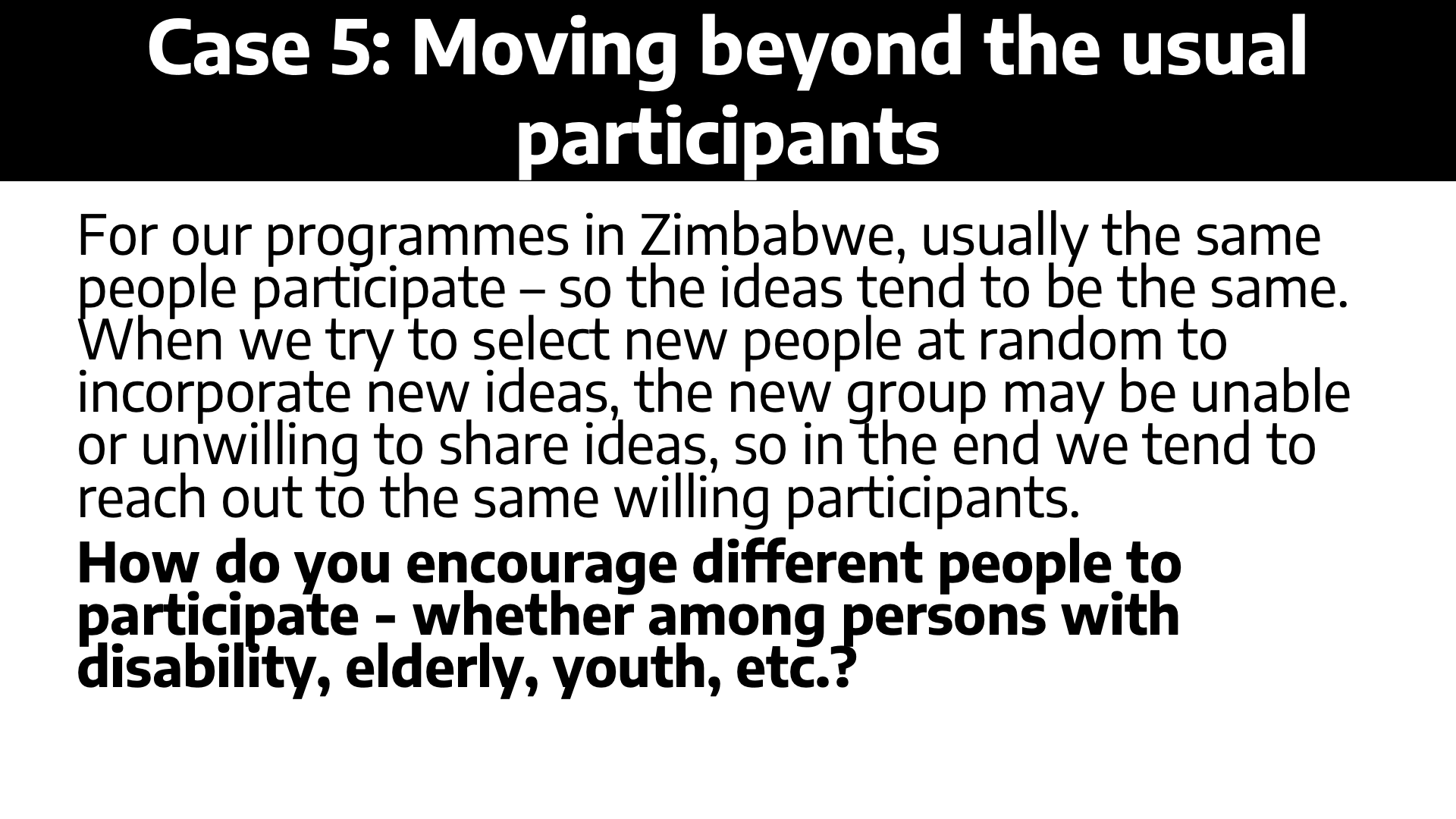
- Create different focus groups/participative activities specifically for some some groups of people.
- If assistance modalities/activities are flexible it would makes sense to invite for greater influencing of the shaping of such assistance. Again, an option could be to engage specialist organisations or use different entries into communities (CBOs).
- Sensitivize the community. Show them the positive result of their participation. Enhance their capacity and motivate them.
- In SSUD I noticed that creativity and imagination regressed due to the constant stress factor, maybe engaging different people and propose a variety of new ideas (ex. combining recycling and Income generating activity) then pilot on a small scale.
- Using the modified UN Human Security model identifies underrepresented and underprivileged communities if it is used intelligently as an assessment toll.
- We should consult separate groups separately to avoid disrupting an existing dynamic (at least at the beginning until they are more comfortable). Creating an enabling environment, where there is true trust is really important in receiving feedback.
- Make sure there is a feedback mechanism so that those who represent today are able to give feedback and information to others.
- "Allow children with and without disabilities in child friendly spaces where they are able to participate, and needs can be identified. Provide ramps and accessible pathway.
- Ensure information is in various formats, have sign language interpreters.
- Have structures and systems in place that makes it irrelevant to have the same people at the table all the time.
- Information dissemination communications and messaging are so important to get right.
- Have someone translate in the local dialect. Allow feedback from the participants.
- Maybe in smaller committee/groups even on one-on-one and record the conversation (through notes, recorder etc) to report back to bigger gatherings, to organisations, governments etc.
Case 6
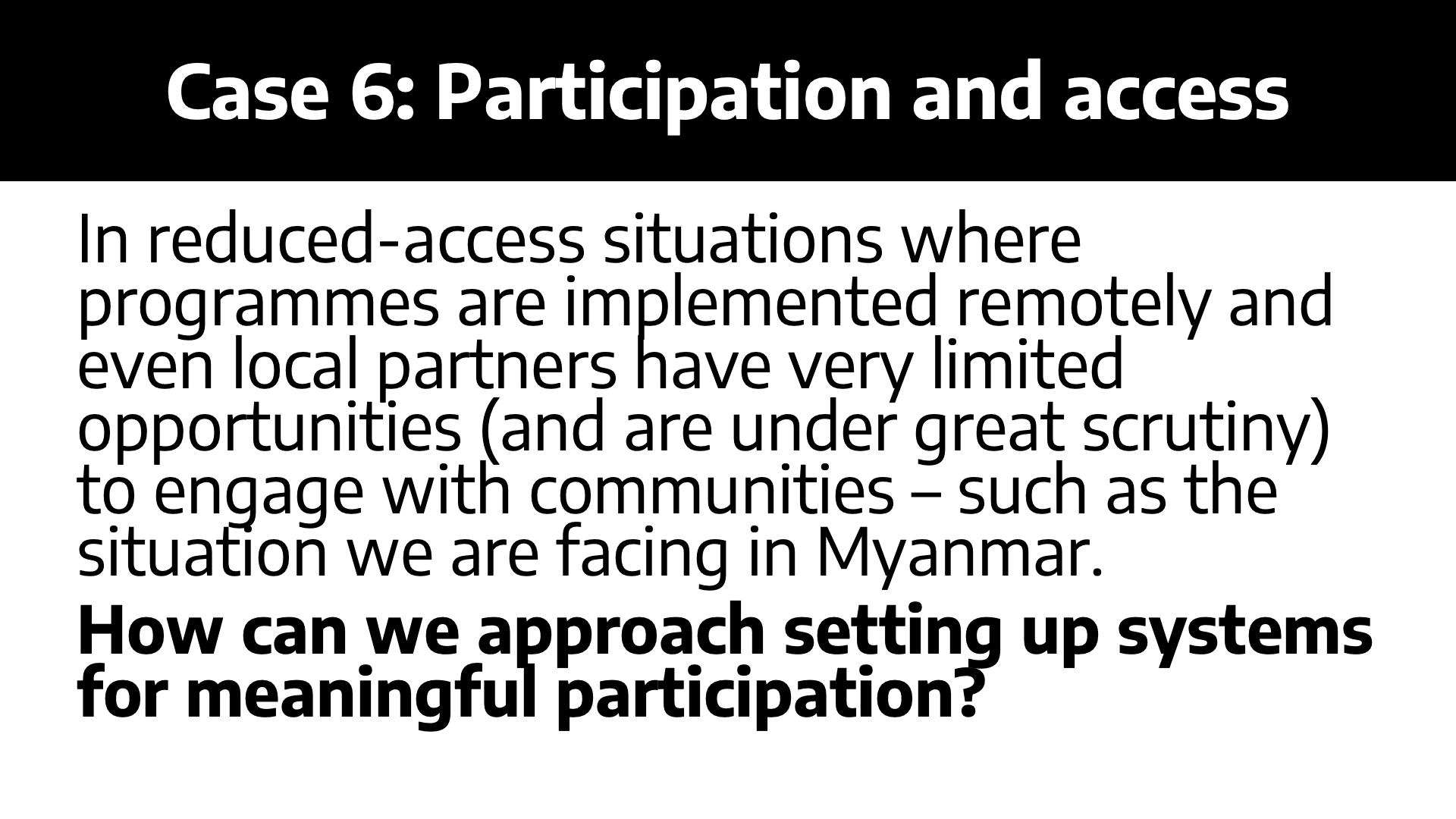
- Empower the community workers to support their communities. Use of technology by providing devices and network where one can support remotely just like during the COVID-19 times.
- The Red Cross Red Crescent Movement has a huge net or volunteers that often come from these communities, maybe this can be an option?
- Communities should be informed in the closure of the project and handed over instead of leaving them in suspense